#tvn mother
Explore tagged Tumblr posts
Text






Kdrama: Love Next Door (2024)
From cuties to cuties 💗 #kdramaedits#korean#shorts #lovenextdoor#jungsomin #junghaein
Watch this video on Youtube: https://www.youtube.com/shorts/rfxwh_CGE8E
#Love Next Door#엄마 친구 아들#Golden Boy#Mother’s Friend’s Son#My Mom's Friend's Son#Mom’s Friend’s Son#Eomma Chingu Adeul#Eomchina#엄친아#2024#tvN#youtube#shorts#short video#kdrama#Korean drama#Jung Hae In#Choi Seung Hyo#Jung So Min#Bae Seok Ryu
25 notes
·
View notes
Text
i will never understand the korean magic of having their actors appear as high school students and then 30 yo people in the next frame what witchcraft sir
#kdrama#korean drama#kdrama review#review#tvn netflix#kdrama text post#kdrama recommendations#the good bad mother#see you in my 19th life#our beloved summer#guardian the lonely and great god#basically all high school dramas???#doctor slump#welcome to samdalri#park hyungsik#park shin hye#ji chang wook#shin hye sun
163 notes
·
View notes
Text
i love it when villain characters start developing feelings
#CHEON DA HYE ARC INCOMINGGG#mother son reunion gonna fuck them up#tvn queen of tears#queen of tears#ep 7
22 notes
·
View notes
Text
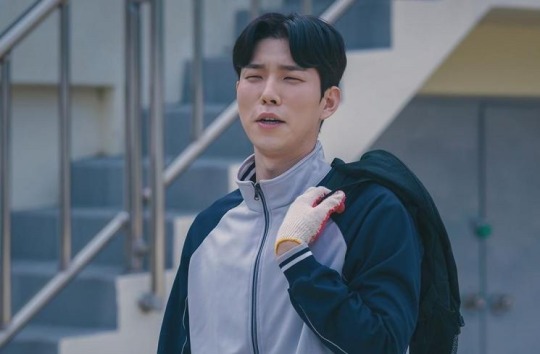
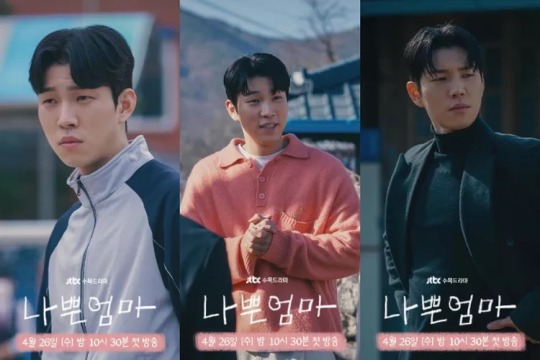

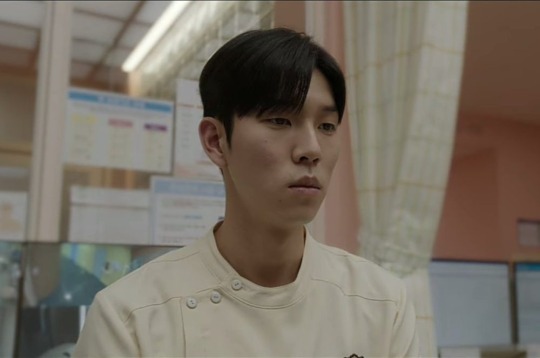

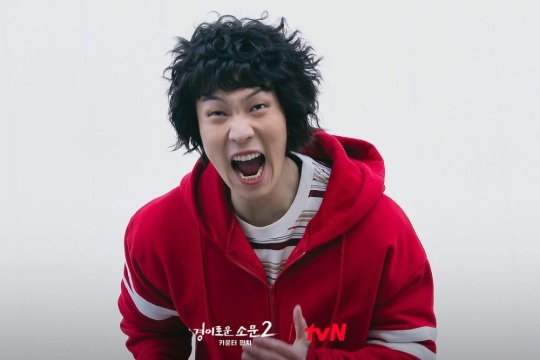


Yoo Insoo’s projects in 2023:
The Good Bad Mother
Daily Dose of Sunshine
The Uncanny Counter 2
Death’s Game
#Yoo Insoo#his versatility is impeccable#one of my favorite actors#actor#Yoo In Soo#Korean#Netflix#netflix korea#the good bad mother#the uncanny counter#the uncanny counter 2#a daily dose of sunshine#death’s game#tvn#kdrama#tvndrama#netflix kdrama
20 notes
·
View notes
Text
Death's Game

LEE JAE-WOOK
If you don't know him. You should. Actor of the netfilx series Alchemy Of Souls (Another fantastic drama )
He is such an amazing actor, every series that i have seen of his, he gave his all. The thing about him is, he is an actor that can play so many diverse roles with dedication.

This is also a part that is crucial to the series where we get to see patterns and later refences to this episode, which makes it lot more fun.

Lee Do-Hyun
Though Lee Jae-Wook and him did not technically work together, I am so glad they were in the same series. Them together would surely pack a punch.
Lee Do-Hyun is another great actor. ( The Good Bad Mother- still has me emotional everytime i think about it, was one of his recent works)
His sweet smile and caring persona was much needed for a break from the intense violence that had carried on the first few episodes. Though this episode was a little less gore, it made up to being extremely filled with emotions. Of regret, shame, hope and love.
#kdramas#kdrama#south korea#tv series#thriller#action#death's game#death#game#lee jae wook#lee do hyun#alchemy of souls#the good bad mother#tvn#tvn drama#violence
4 notes
·
View notes
Text
An album that needs to be compulsory for any "Jeongnyeon : A Star Is Born" watchers because HOW DARE they watch a drama about the 60s, Pansori/Gugak, Female Gukgeuk plays, Trot, early TV etc and somehow miss ALL the context and knowledge. Like. This is unfair. I should be watching those dramas and be updating you guys on what you didn't know, any reference you missed etc. but I have 0 time to actually do that and I'm finding out about plot points through YT shorts. Ain't that funny...
The kdrama industry is really taking directly after my mind recently, it's giving me so many dramas and shows where I would be interested and I just... keep on missing it. Like, I had once imagined the Fin.K.L. members becoming the "mother" of an idol for a TV show and BANG, KBS did "Godfather". I imagined a drama about a kisaeng group and tvN does Jeong Nyeon (it's not necessarily about kisaengs but related to gugak). I'm scared. What if they read my mind? Are we gonna get a drama about a foreigner going to Korea and becoming a star overnight? Falling in love with a rich actor's son?? Are we possibly getting... Moraeshigye 2???
#jeong nyeon#a star is born#kim tae ri#geonjeongayo#60s music#60s trot#Trot music#gugak#this is actual fusion music bishes#8090s kdrama thoughts#my thought#crazy thoughts#Spotify
8 notes
·
View notes
Text
Jang Man Wol and Go Chung Myung as Eros and Psyche
In this meta, I will be illustrating how the storyline in the 2019 tvN K-drama Hotel Del Luna between its protagonist Jang Man Wol and second male lead Go Chung Myung follows the Aarne-Thompson-Uther folktale type 425: Search for the Lost Husband, while also containing elements of ATU-400: The Quest for the Lost Bride. In particular, I will be pointing out parallels to famous versions of these tales from Greek mythology: ATU-425: Eros and Psyche, and ATU-400: Orpheus and Eurydice. I am by no means an expert on this topic, so feel free to share where you disagree with me and point out any mistakes.
Before I go on, be advised: the following post will include mentions of violence, capital punishment, suicide, and all of the darker elements that were present in the historical subplot of Hotel Del Luna.
Part 1: Jang Man Wol and Go Chung Myung as Eros and Psyche
The myth of Eros and Psyche is said to be the prototypical version of the Beauty and the Beast story. Other tales classified under ATU-425 feature an Animal Bridegroom. After a taboo is broken, the animal husband flees from the bride, and she must complete a series of tasks or embark on a long journey to reunite with her lost husband.
A Mission Gone Awry:
The original version of Eros and Psyche comes from Apuleius’ Metamorphoses as a story within a story. The tale begins with the youngest and most beautiful daughter of a king and queen, Psyche, attracting so many admirers that people have started worshipping her instead of Aphrodite (Venus), the goddess of love. The jealous Aphrodite sends her son Eros (Cupid) to make Psyche fall in love with a hideous and wretched creature. However, rather than carrying out his mother’s bidding, Eros mistakenly pricks himself with his own arrow and consequently falls deeply in love with Psyche upon the sight of her sleeping form. In other words, the script gets flipped on Eros who is wounded by his own weapon.
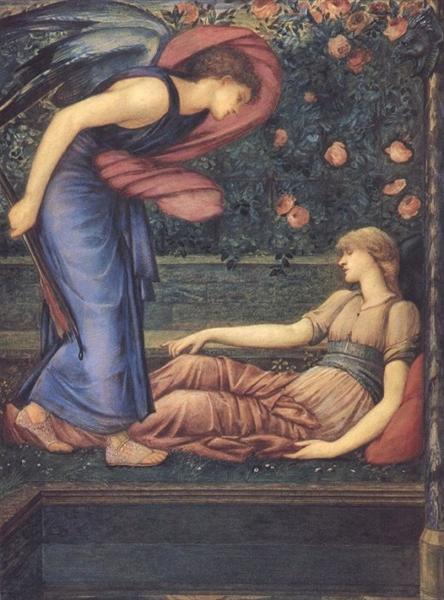
[Cupid Finding Psyche by Edward Burne-Jones]
Man Wol and Chung Myung’s first meeting bears a few similarities. After Jang Man Wol’s gang of bandits attacks Princess Song Hwa’s caravan, royal guard captain Go Chung Myung chases her down, intent on capturing the gang leader. However, instead of successfully carrying out this mission, Chung Myung becomes mesmerized by Man Wol’s beauty. Man Wol knocks him unconscious while he is distracted and takes him hostage. He is both held captive and captivated by her. Princess Song Hwa, the one who sent Chung Myung, will be playing the part of the jealous Aphrodite in this story.
In both stories, our heroine poses a threat to a royal/divine mother figure who takes this as a personal affront. A young man under her authority is sent to condemn the heroine to a dark fate. The hero fails to carry out this mission and ends up falling in love with the heroine instead.

Man Wol appears as if asleep à la Sleeping Beauty.

She flips the script on this lovestruck fool.
The Mythical Snake-Husband:
Eros, the god of desire, is feared even by Zeus, for a shot from his arrow fills his victims with uncontrollable infatuation often resulting in infidelity and adultery. He is sometimes described as a serpent who flies on black wings. It is meant to be understood that, in a way, Eros is exactly the kind of monster that Aphrodite wished Psyche to wed.
In other fairy tales classified under ATU-425, the bridegroom is a young man, often a prince, who has been transformed into a monster, animal, beast, etc. He may take the appearance of a bull, pig, bear, snail, etc., but most often he appears as a snake or a bird such as in the Mexican fairy tale El Pájaro Verde, or the Italian fairy tale The Enchanted Snake.
Most obviously, Chung Myung takes the form of an animal when his soul is eventually transformed into a firefly. But, unlike the heroes in Animal Bridegroom stories, Chung Myung begins his story as just a regular man, not a beast or monster. That being said, when his character is first introduced in the show (and to Man Wol), we see him as a fearsome warrior and formidable swordsman. As Man Wol’s captive, he flirts with her in an attempt to convince her to let him go. At first, it is unclear whether he is simply trying to pull a fast one on her, and for a moment it seems like he is going to leave her for dead when she gets caught in quicksand. His initial shiftiness as well as his lethal capabilities make him, metaphorically-speaking, akin to a snake.
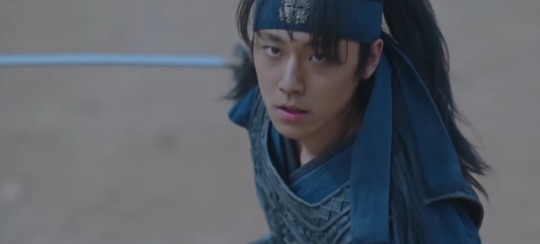
The Beautiful Lonely Heroine:
Psyche, the youngest and most beautiful of three princesses, is plagued by solitude. She despises her own beauty for making her singularly lonely. Even though she is widely adored, no one wants to approach her. She resents her virginity as it represents her loneliness and longing for romantic companionship.
It’s worth mentioning that in other Lost Husband stories, the heroine is often depicted as a paragon of idealized femininity: young, beautiful, unquestioningly obedient to her father, kind, gentle, self-sacrificial beyond reason. Compare that to her older sisters who are portrayed as vapid, jealous, and vain, the latter primarily for “turning up their noses” and refusing to marry an animal bridegroom unlike their younger sister who is inexplicably totally cool with it. These polarized depictions of femininity, while regressive and devoid of nuance, are commonplace in fairy tales, and the lack of depth could even be considered a defining genre convention (see Max Lüthi's criteria for märchen in The European Folktale: Form and Nature, particularly "depthlessness").
Although the fierce thief Man Wol doesn’t fit this model of idealized feminine heroine, she does have some things in common with her fair-maiden counterparts. She, too, suffers from loneliness, and, as a transient bandit, she is emotionally isolated. Apart from her foster brother Yeon Woo, she doesn’t allow others to get close to her.
In the first flashback shown of her past, she says that she envies trees because they don’t have to wander around. She laments that “it must be nice to just put down roots and settle down.”

Man Wol’s conversation with Yeon Woo in front of the great oak tree reveals that she longs for stability and a way to live past her youth, neither of which her nomadic life as a bandit can provide her. When Yeon Woo offers to build Man Wol a house out of the wood from the giant tree, she teasingly turns him down. Considering the great oak tree symbolizes Man Wol’s desire for longevity, that Yeon Woo specifically promises to cut it down demonstrates the impossibility of their situation. His words to Man Wol in this scene about transferring his extra years to her are poignantly prophetic:
Yeon Woo: We all grow old. You should think about putting down roots. I can’t let you live under a tarp when you’ve become an old lady.
Man Wol: I could be captured and killed at any moment. That’s my life. I don’t even expect to live until I’m old.
Yeon Woo: But you can. The fortune teller said that I’ll live a long life, just like this tree. I’m expected to live 100 years, so I’ll give you my extra years.
Man Wol: If you do that, you’ll die.
Yeon Woo: You’re right. It’s okay, though. I don’t mind dying for you, so you can have it all.
Not only does this scene foreshadow Yeon Woo’s heart-wrenching sacrifice on Man Wol’s behalf, but it also indicates that, under Man Wol’s current circumstances, a life must be “cut short,” be it the tree’s or Yeon Woo’s, in order to secure the longevity and stability she desires.
Whereas Psyche expressly wishes to find love, especially after her two older sisters are both married and she cannot find a husband, Man Wol's desires do not necessarily require love to achieve. However, “settling down” and “putting down roots” are conventionally achieved via marriage.
Merging of the Wedding and Funeral Rites, A Leap of Faith:
After consulting the Oracle of Apollo who tells them their daughter is to marry a hideous monster, Psyche’s parents assume this is a sure death sentence. In funeral attire, Psyche is taken to the edge of a cliff to be carried by the west wind Zephyr to Eros’s palace. She bravely accepts her fated marriage, takes the plunge, and encounters her mythical bridegroom in an enchanted palace in the forest. In blurring the lines between the wedding and funeral rites, death and love are depicted as intertwined.
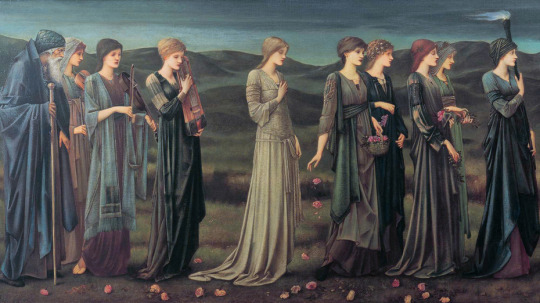
[Psyche’s Wedding by Edward Burne-Jones]
The most prominent moment when a wedding and funeral are merged in Man Wol’s backstory is during her deadly confrontation with Chung Myung in the royal bridal chamber. But more on that later. Sticking to this pair’s first meeting, a moment occurs that could be interpreted as her taking a leap of faith. Man Wol chooses to release her captive Chung Myung in hopes that he will save her from being swallowed by quicksand. In tossing him her sword so that he can cut himself free, she places her life in his hands. Chung Myung in turn, rather than escaping when he has the chance, saves his captor from the brink of death.
The Heroine Grows Affectionate toward her Nighttime Visitor:
Psyche is well provided for in Eros’s enchanted palace, but he only comes to visit her at night when it is dark and she can’t see him. Initially, Psyche is hesitant about the intimacy they share at night, but eventually she grows to enjoy those moments.
In other Animal Bridegroom stories, the groom takes off his animal skin/feathers in the heroine’s bedroom and reveals himself to be a handsome youth by night. The heroine grows fond of him and the private conversations they share together, but he must disappear with the rising sun.
Chung Myung meets Man Wol at the moonlit lake to share wine. At first, she is annoyed that he has disrupted her solitude, but he tells her that the view of the lake has gotten better since he arrived because she is no longer alone. Then, he says that in the future whenever she drinks there by herself, she will be waiting for him to show up like he did that night. These words prove true, as Man Wol evidently grows to crave Chung Myung’s company so much that she is willing to sneak into the Princess’s castle at the risk of her own life just to see him.

Due to the forbidden nature of their relationship, Man Wol and Chung Myung’s trysts must occur under the cover of darkness.
The Bride and Groom are Married in a Symbolic Union:
With their marriage consummated and a bond forming between them, Eros and Psyche are no longer married only in name. At this point, they are referred to as husband and wife, not just the bride and groom of a sham marriage.
While marital and botched proposal imagery are evoked at several points throughout Man Wol and Chung Myung’s love story (which I will discuss further down below), I would pinpoint the moment they become symbolically married as when they are seated together in front of the fire, and he signs her name with her finger on the surface of a rock. This is the scene in which their bond is cemented, quite literally, in stone, and their feelings for each other are made clear.


A Voice of Doubt Leads the Wife to Act Against Her Husband’s Wishes:
When Psyche’s sisters visit her in her luxurious palace, they sow doubt in her about the true form of her husband. They make her believe that her husband is truly dangerous and convince her to look upon Eros’s true form and kill him if he really is a monster.
In many Animal Bridegroom stories, the jealous sisters or an overprotective father may directly harm the husband, believing him to be devouring the bride at night. In other variants, the heroine asks about her husband’s origin, shares his secret identity with others, or looks upon his true form when he specifically forbade it. This constitutes breaking a taboo and/or a betrayal of the husband’s trust.
For Man Wol, the voice of doubt about her relationship with Chung Myung comes from inside herself rather than from an outside source. After Man Wol tells Chung Myung that she and her clan of bandits are leaving to join the rebellion, he offers to risk his life and run away with her. But she declines and breaks things off with him.

In this impersonal statement of rejection, Man Wol alludes to the external obstacles that stand in between this couple’s happiness: her clan joining the rebellion against the kingdom that Chung Myung serves, their difference in class and standing in the law, the imminent war that stands between their peoples, etc. Although these obstacles are great, they seem to be just excuses for what is really holding Man Wol back—the internal obstacles within herself.
Needing to have relied on herself alone for so many years, Man Wol is fiercely independent and unaccustomed to letting others in. Her doubts, perhaps self-doubts, and hesitancy in commitment are the real reasons for this “break-up,” not the meddling of pesky relatives as in other Animal Bridegroom tales. In fact, the character you would expect to play the role of an overprotective or jealous family member, Yeon Woo, is quite supportive of Man Wol’s relationship with Chung Myung, and even encourages her to follow her heart when he senses she might not come back from bidding Chung Myung a final farewell.
Yeon Woo (joining Man Wol at the foot of the giant tree): Everyone’s ready. When should we leave?
Man Wol (gazing at the jug with her symbol tied to the tree): He was here. He’s probably there now. Let me go see him one last time.
Yeon Woo (catching Man Wol’s wrists to hold her back): Man Wol-ah. Will you come back?
Man Wol: Yes. Of course, I’ll be back.
Yeon Woo (dropping Man Wol’s wrists, he gives a sheepish smile): You don’t need to come back. I’ll be fine either way, so do as you wish.
Breaking the Taboo, a Betrayal of Trust:
Psyche listens to her sisters who tell her to approach her husband with a lamp to see his true identity and a dagger to kill him if he truly is a monster. When Psyche follows through with this plan and sees Eros’s true form exposed, this constitutes a betrayal of his trust. In other Animal Bridegroom stories, the wife does the one thing her husband specifically forbids her from doing which is often sharing his secret with a nosy family member. At this point, he assumes his animal/beast form and flees his bride.
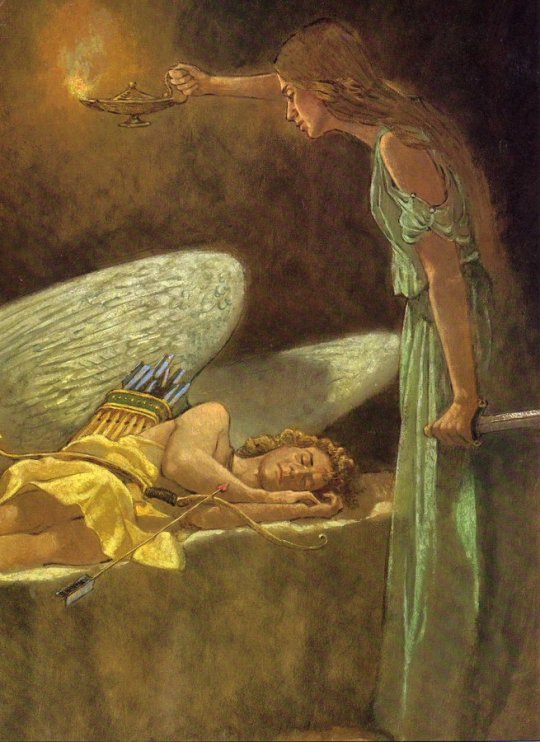
[From Favorite Greek Myths illustrated by Troy Howell]
This may seem counterintuitive, as Chung Myung is the one who ends up outright betraying Man Wol, but when Man Wol allows her fears and doubts to take hold of her and forsakes her love, this can be considered “breaking the taboo.” Her rejection of Chung Myung and of her true feelings leads to a series of events that results in Chung Myung’s “beastly” form being revealed—that is, his capacity for betrayal, deception, and acting in his own self-interest at the expense of those around him—i.e. the metaphorical qualities of a snake. This might sound like a circular line of thinking (it is), but I am framing this sequence of events in this way for the purpose of reading the story as a Search for the Lost Husband tale rather than a Quest of the Lost Bride tale in which the roles are reversed. On that note…
Part 2: Search for the Lost Husband or Quest for the Lost Bride?
(a.k.a. an aside in which I ramble on)
In a Search for the Lost Husband story, a betrayal such as Chung Myung’s on the part of the mythical husband would constitute a role reversal, and thus would be incredibly rare. However, a husband’s betrayal is commonplace in Quest for the Lost Bride stories. So, you might be asking yourself, other than switching the gender roles, how are ATU-425: Search for the Lost Husband and ATU-400: Quest for the Lost Bride stories different? Well, the biggest difference is in the story’s conclusion. A Search for the Lost Husband story usually has a happy ending with the couple reuniting, while the husband’s Quest for his mythical wife is usually unsuccessful. There are a few reasons for this, which I will get into later, but for now, all you need to know is that, in general, a betrayal by the mythical husband usually results in tragedy whereas a betrayal by the mythical wife usually ends with her successfully recovering her lost husband.
Because the love story between Man Wol and Chung Myung is ill-fated, in my interpretation, it follows the tragic Quest for the Lost Bride route. It includes hallmarks of tragedy such as a permanent separation of the mythical couple (as seen by Man Wol turning her back on Chung Myung on the bridge to the afterlife) and the husband wallowing away in grief and despair for the remainder of his days (as seen by Chung Myung remaining as a firefly for 1300 years only to cross the bridge by himself). However, as I hope to demonstrate in this meta, Man Wol and Chung Myung’s story also contains enough elements distinct to Search for the Lost Husband stories that, in my opinion, it could have gone either way, either ending with permanent tragedy for the pair, or happily with a love that transcended death. The show-writers were probably well aware of this, as the show itself seems to toy with the idea of Koo Chan Sung, the first male lead, being the reincarnation of Go Chung Myung, but eventually this is revealed to be a misdirection.
In addition to containing many unmistakable elements of ATU-425, Man Wol and Chung Myung’s story already sees many elements reversed anyway. It is Chung Myung, the hero, who is associated with royalty/nobility, not the maiden Man Wol. She is the one who is an outlaw and is shown to be quite ruthless, fierce, and scary, like the villainous Eros.
A critical aspect of the Eros and Psyche myth is that both Eros and Psyche must undergo joint journeys toward individuation. As a result, their journeys can naturally be thought of as parallel if not interchangeable. In this way, having Man Wol and Chung Myung move back and forth between the positions of Eros and Psyche, or “lost spouse” and “searching spouse,” does not actually contradict the story structure of the Eros and Psyche myth. Furthermore, often a husband’s failed quest for his lost bride serves as a prelude to a switch to the feminine perspective in which the wife’s search for her lost husband is successful.
We know that for as long as Chung Myung had remained with Man Wol as a firefly, she, too, had spent all those years waiting for him to arrive at her hotel. Given that the pair was mutually waiting for the other for over 1300 years and with a curse of her own for Man Wol to overcome, when Man Wol finally says Chung Myung’s name and he reappears before her, it seemed like all the ingredients were there for a successful recovery of the lost animal husband and the mythical couple reuniting in love and joy. This is also the moment when the flower petals of the Moon Tree finally fall, indicating that Man Wol’s punishment has come to an end. Despite this, the show still sticks to the unhappy Quest for the Lost Bride trajectory for this pair.
Typically in a Quest for the Lost Bride tale, the husband's betrayal is due to his fear, arrogance, or lack of faith in/faithfulness to his wife. These attributes are then harshly punished by the story’s tragic end for him. Although perhaps fear factored into Chung Myung’s decision to betray Man Wol, and arguably heedlessness into him getting caught in the first place, his reasoning for the betrayal, rather than highlighting a fatal flaw in his character, paints him as a victim of circumstance more than anything else. He was backed into a corner by the princess and coerced into betraying Man Wol against his own wishes while making a bargain for her life to be spared. It would seem that this betrayal was not about saving his own neck (he told Yeon Woo he was planning on paying for his sins with his life afterward), but rather saving as many innocents as possible (his relatives in the castle and the Gaori villagers).
As punishment for his misdeeds, Chung Myung dies by Man Wol’s sword and remains as a firefly, unseen to her for 1300 years, both of which were fates he elected for himself. Yet, after he finally has the chance to explain his side of the story to Man Wol, and she is able to make peace with what happened and let go of her grudges, for some reason the narrative isn’t through punishing him. Man Wol abandons him on the bridge to the afterlife, and the pair is separated forever after. The remorseful Chung Myung’s ultimate fate is characterized by eternal punishment and heartache for offenses that were deliberately portrayed by the narrative in a sympathetic light. This eternal punishment, in my opinion, comes off as exceedingly harsh, especially in contrast to other characters like Man Wol and Princess Song Hwa who had the blood of many on their hands, yet were both given happy endings in which they were able to find love again.
Part 3: Chung Myung and Man Wol as Eros and Psyche (cont.)
As much as a part of me relishes in the tragedy and melodrama of the storyline the show gave us with Man Wol and Chung Myung, my biggest qualm about its ending is that it retroactively suggests that Man Wol’s decision to forsake her love with Chung Myung was the right one? She alluded to the worldly barriers that stood between them when she told Chung Myung they could never be together. She spoke those words out of cynicism and guardedness, and she was at her least authentic to herself and her true desires when she said them. And yet, the narrative ultimately proves them correct? After a millennium had swept away the conditions that had made their love precarious and impossible in the first place, Man Wol still ended up being right: their love was not meant to be; it was never meant to be. (╥_╥)
The Husband’s True Form is Revealed, the Wife’s Love for him Deepens:
Psyche approaches her sleeping husband armed with flame and steel, prepared to kill him. When she discovers that he is the beautiful god Eros, she accidentally pricks herself with one of his arrows and falls even more in love with him. In other Animal Bridegroom stories, the wounded husband flees, and the distraught wife loves him so much that she is willing to walk to the ends of the earth, often until holes have been worn into the soles of iron shoes, to find him.
For Man Wol, there are two scenes in which she approaches Chung Myung equipped to kill him. The first plays the wife’s-love-deepening trope straight whereas the second directly subverts it.
In the first, Man Wol is hiding in a shed as a runaway slave. When someone enters the shed, she jumps out from her hiding place and blindly attacks the intruder with her dagger, unaware that it is Chung Myung. It is only when he catches her wrist mid-swing that she stops and sees his true identity. Her eyes quiver in recognition. The framing of this sequence—the use of slow motion, the soft music, the pair’s heavy breathing and parted lips, the symmetry of their silhouettes—indicate that this moment is especially significant; we are watching the moment when they fall for each other.
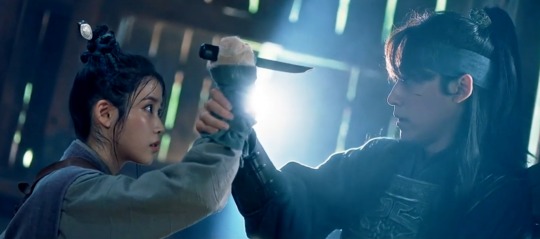
Afterward, Chung Myung protects Man Wol by telling the soldiers who are looking for her to search elsewhere. This is followed up by a scene of Chung Myung bandaging Man Wol’s wound, clear visual language for the care and tenderness between them.
The second time Man Wol is prepared to kill Chung Myung is, of course, in the royal bridal chamber. There, she intends to destroy him, particularly the “monstrous” part of him that is loyal and wedded to the princess. She wields her sword (steel), then burns the palace to the ground (with flame).
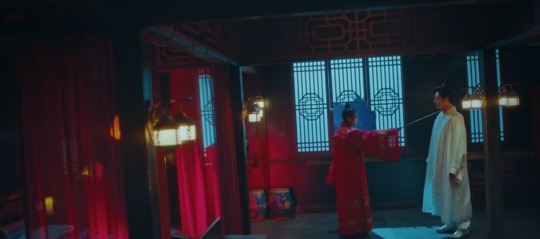
At this point in the story, Chung Myung’s loyalties had already been put to the test after he found himself at a crossroads when confronted by Princess Song Hwa. Seeing Chung Myung’s “true colors” revealed, Man Wol, rather than growing in love, grows in deep hatred of him.
A Harsh Light Exposes What Lies in the Darkness, The Snake Recoils:
The light from Psyche’s lamp reveals her husband’s true form. She becomes so startled that, in addition to pricking herself with one of Eros’s arrows, she spills hot oil from her lamp onto him. The wounded Eros recoils and retreats to the protection of his mother, Aphrodite.
Psyche had, quite literally, been kept in the dark about the identity of her invisible husband. When she casts his true form into the light, this can be read allegorically as her leaving a childlike state of ignorance behind and gaining a sense of consciousness. This new knowledge and awareness, although initially leading to pain and heartache, is ultimately necessary for Psyche—who represents the human soul—to individuate and enter true adulthood. Eros represents Psyche’s Shadow, her repressed desires that she fears to claim. When Psyche wields the knife and lamp, she strips back her own illusions and refuses to continue living in the dark. Psyche’s pursuit of Eros—the Soul’s pursuit of Desire—elevates her from her mortal status. The product of this union is a daughter named “Joy.”
One notable parallel to Man Wol and Chung Myung’s story is that Chung Myung, under the threat of never seeing Man Wol again, leaves the signal to meet at the lake where he awaits her with what appears to be a token of betrothal.
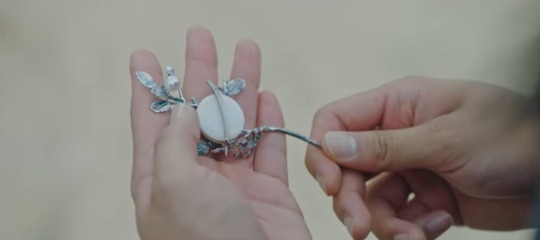
He is exposed in the sense that he sets up this meeting in broad daylight for a change, as well as in that Princess Song Hwa arrives first to expose him as a colluder with the rebellion and a traitor to his country. Under duress, he retreats to the side of Princess Song Hwa who corresponds to Aphrodite.
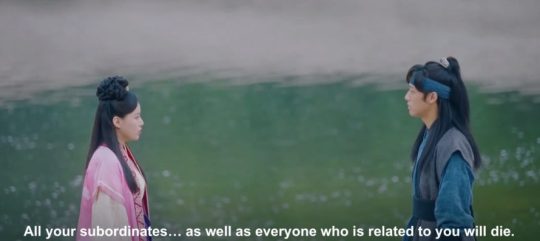
However, I think the comparison becomes much more interesting if we think of Man Wol as the snake-like Eros and Chung Myung as the light-bearing Psyche. Chung Myung—the man who was transformed into a firefly and whose name (hanja: 清明; pinyin: qīngmíng) translates to “Pure and Bright”—is the light that reveals Man Wol’s true self. He draws out her capacity to be warm-hearted despite her cynicism. Man Wol (hanja: 满月) is the “Full Moon” whose glow is only a reflection of the light cast upon it (from the Sun. Yes, I’m invoking Yin and Yang here). Man Wol cannot hide her true self from Chung Myung because he sees through the front she puts up and the walls she has built around her. She shows discomfort with this vulnerability such as after Chung Myung surmises that she came to see him in the castle because she had missed him while drinking alone.

When Chung Myung offers to run away with Man Wol, his light shines too brightly, and she recoils from him. But we know she is acting against her true desires as seen by her tearful look as she watches him leave and by her impetuousness to see him one more time. The break-up scene between Man Wol and Chung Myung presents a moment in which Man Wol must confront the desires that she has been desperately trying to conceal from herself but outwardly manifest in the form of Chung Myung.
In forsaking her love, Man Wol acts in fear of her desires. On the other hand, this break-up can simultaneously be viewed as an act of Man Wol’s agency to make decisions about her own life. She is well within her rights to end this relationship as it had always been incredibly risky, even scandalous, for both involved. Chung Myung had been looking the other way and, at times, actively helping out a gang of criminals. Man Wol had been placing her trust in someone whose job it was to arrest and capture people like her.��Her reasons for joining the rebellion—it’s better than living as a thief, getting caught, and dying young—see her taking steps toward achieving the stability and longevity that she wished for. It’s just that she couldn’t conceive of a way to achieve these things while keeping Chung Myung at her side (when arguably this may have been possible). I also think that Man Wol truly thought that putting her feelings aside and breaking things off between her and Chung Myung was the safest decision for the two of them. In a cruel twist of irony, however, this indirectly leads to the catastrophic series of events that occurred in the fallout of their relationship that the break-up was intended to prevent.
In my opinion, Man Wol’s character arc on the show, in addition to resolving her deep grudges and healing from her past, should have involved her learning not to run away from her desires and integrating her Shadow/animus.
The Wounded Husband Flees and is Confined, the Heroine is Tormented:
The injured Eros is looked after by his mother Aphrodite who confines him in her house for far longer than he wishes or is necessary for him to recover. As Psyche continues to seek her lost husband, the furious Aphrodite drags her by the hair and has her whipped and tortured by her lackeys Sadness and Sorrow.
In other versions of ATU-425, the fleeing husband becomes fatally ill or is about to be married off to another bride, often a monster or ogress who, like Aphrodite, holds him against his will. Symbolically, these two fates are the same as the prince’s illness is akin to being wedded to Death. Typically at this point, the heroine arrives just in time to cure her lost husband or rescue him from a loveless marriage.
After Man Wol’s rejection, Chung Myung returns, against his wishes, to the side of Princess Song Hwa. When Man Wol rides to the lake seeking him, she encounters Song Hwa instead who gleefully has her arrested while mocking her as the cause of her people’s demise.

As a quick aside, Princess Song Hwa is wearing a completely different robe when she confronts Man Wol from the one she wore when confronting Chung Myung at the lake which could indicate that a significant amount of time passed between these two occurrences. They may have even taken place on different days, meaning Man Wol arrived much too late.
Chung Myung is forced to marry Song Hwa even though his heart still belongs to Man Wol. Our heroine Man Wol arrives on the night of the wedding to kill him rather than to rescue her mythical husband from his marriage to the Death-bride.
The Heroine Undergoes an Arduous Journey to Reunite with her Lost Husband:
In order to see Eros again, Psyche must complete four seemingly impossible tasks given to her by the angry Aphrodite (in other tales it’s usually three impossible tasks, but Aphrodite is extra mean and gives Psyche a fourth). Eros’s hand is present in the assistance she receives for each task—in the ants, river spirits, eagle, and tower that come to her aid. The completion of these tasks credits Psyche for her bravery and persistence, and therefore she is presented as worthy of her divine husband. The details in other ATU-425 stories vary widely but are largely unimportant. Typically, the heroine will have to travel a great distance, collect magical items, and accept supernatural aid in order to recover her lost husband.
After the deadly night of the royal wedding, both Man Wol and Chung Myung have long journeys ahead of them to atone in some way for the sins they committed in their lives. Man Wol becomes cursed as the owner of the Guest House of the Moon and receives assistance in the form of Koo Chan Sung who himself receives guidance at pivotal moments from Chung Myung’s ghostly insect form.
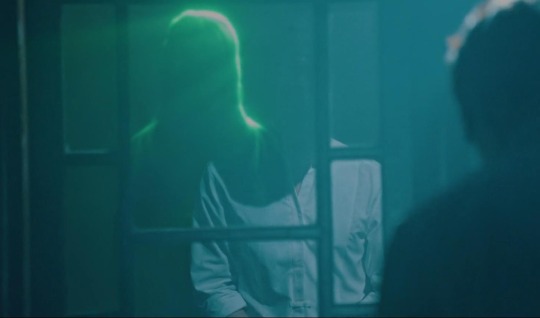
This struck me as similar to how Eros is present in the small insects—ants—who help Psyche complete the first task of sorting out the grains. Chung Myung’s unwavering persistence in remaining at Man Wol’s side as a firefly is shown to have impressed Mago and even the Grim Reaper.
A “seemingly impossible” task needs to be accomplished for both Man Wol and Chung Myung’s curses to be lifted: the Moon Tree must bloom and wither flowers—meaning Man Wol’s heart must soften—for time to flow for her once again; for Chung Myung to regain his human form and appear before Man Wol she must utter his name, a feat rendered seemingly impossible due to Man Wol’s deep-seated resentment.
A Trip to a Realm only Accessible to the Dead, Another Way:
When Psyche is successful in completing three impossible tasks, Aphrodite makes one final attempt to get rid of her. Psyche must descend to the Underworld and bring back a piece of Queen Persephone’s beauty in a box to be delivered to Aphrodite. At first, Psyche believes that the only way to reach the Underworld is to die, so she prepares to fling herself from a tower. But Eros speaks to Psyche through the tower, instructing her on another way to enter the Underworld. He gives her highly specific instructions as well as coins for the boat ride across the river Styx. She must not deviate from these instructions lest she remain trapped in the Underworld forever.
Wanting absolution for all the lives she took, Man Wol journeys to the end of the road in search of the mythical Guest House of the Moon where the souls of the dead gather and are consoled. As the afterlife in this story leads to reincarnation and new life, it does not correspond to the Underworld; the Guest House of the Moon is more of an equivalent as it is a mythical, if temporary, abode for the souls of the dead. When Mago tells Man Wol that only the dead can go there, Man Wol draws her sword to her own neck, saying she is willing to take her own life just to get there.

Mago tells Man Wol that it is foolish to think she can compensate for her sins with her life this way. Man Wol becomes tied to the Moon Tree instead, caught between life and death and cursed to serve as the innkeeper of the Guest House.
Just like Man Wol, Chung Myung believes the only way he can pay for the debt of his wrongdoings is with his own life. It is the voice of Yeon Woo that stops Chung Myung from doing this and insists there is another way for him to pay for his sins—he must live on as a traitor to ensure that Man Wol survives.
Traps and Risks in the Underworld:
Several traps lie in Psyche’s way as she journeys to Hades, chiefly if she opens the casket containing Persephone’s beauty out of curiosity she will never return from the Underworld.
The biggest trap set for Man Wol is the possibility of her giving into her anger and resentment, becoming an evil, spiteful ghost and vanishing forever. This would mean she would never leave the Underworld of the Guest House or move onto the afterlife to be reborn.
Chung Myung, who is also stuck in this Underworld as Man Wol’s first guest, also faces a great risk there. Over the 1300 years, his soul has become weary and his light has faded. With little energy left, he may vanish before reaching the bridge to the afterlife.
Facing Temptation, Return from Death’s Clutches:
Psyche carefully follows all of Eros’s instructions and manages to escape the Underworld. Thinking she has succeeded, Psyche wishes to take some of Persephone’s beauty for herself to please her husband. But what’s in the box is the Sleep of Death, and she falls down lifeless. Eros, who has healed and can no longer bear Psyche’s absence, breaks free from his prison and wipes the sleep from her eyes.
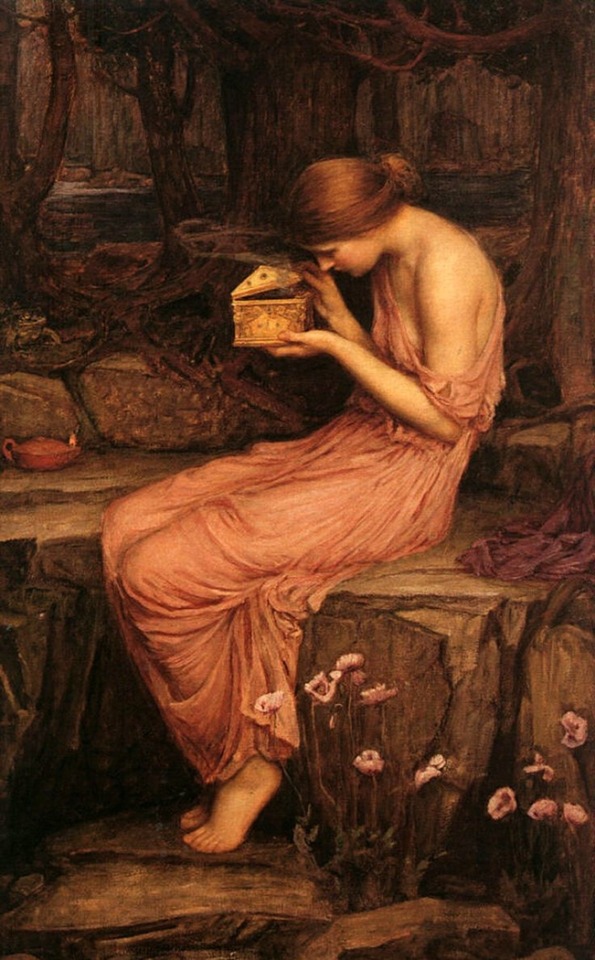
[Psyche Opening the Golden Box by John William Waterhouse]
In other versions of ATU-425, the prince is on the brink of death or about to marry another woman when his wife finds and rescues him. To save the lost husband, the heroine must perform a task that only she can do, or use a blood sacrifice to cure his affliction. In this way, she is uniquely able to save him from a literal/spiritual/metaphorical death.
Chung Myung’s marriage to a false bride is interrupted by Man Wol who infiltrates the castle intending to kill him. In some cases, such as with a snake-husband, a violent means is necessary to break the curse. With a snake, death or burning of the snake’s skin are typically the only ways for the snake-husband to be transformed back into his true self. Since Chung Myung has taken on the metaphorical qualities of a snake, it could be argued that only by dying and the subsequent burning of his body can he regain his humanity. Thus, Man Wol’s decisions to slay Song Hwa, the Death-bride, run Chung Myung through, and burn down the castle, while ruthless, are not, by themselves, mythically inconsistent with the ATU-425 folktale type.
1300 years later, Man Wol knows that her encounter with Chung Myung is inevitable, and she must face her temptation to give into her anger, destroy his soul, and vanish forever. However, after hearing his side of the story and learning of the promise he made to Yeon Woo, Man Wol’s anger dissipates. She is seemingly able to forgive Chung Myung, or at least let go of her resentments toward him.
The one final task that Man Wol is assigned by Mago is one that only she can accomplish: she must see Chung Myung off and accompany him on the bridge to the afterlife, thus saving him from vanishing forever i.e. spiritual death.
Recognition Motif:
After the heroine rescues her lost husband, typically there is a moment when the prince finally recognizes the heroine after their long separation and declares her his one true wife. The lost husband may not recognize the searching wife until she performs the one task that only she can do or until she shows the lost husband a gift she once received from him.
Apotheosis, Sacred Marriage, Happily Ever After:
A moment of recognition on Man Wol’s part occurs when Chung Myung’s ghost, while in possession of Chan Sung’s body, caresses Man Wol in a hauntingly familiar way. Later, she realizes that the firefly is Chung Myung who has been with her all along. She says his name, and he appears before her. A moment of recognition on the part of would-be prince Chung Myung happened much earlier in the bridal chamber when he said he wished to welcome Man Wol as a beautiful bride (his true bride).
Eros and Psyche have a proper wedding that is blessed and attended by all the deities. She eats ambrosia which makes her immortal so that the pair can be united for eternity as equals. Psyche, now a deity in her own right, gives birth to a daughter named Hedone or “Joy.”
Man Wol and Chung Myung walk down the bridge to the afterlife together, but stop midway. There, on the edge of eternity, Chung Myung offers Man Wol his hand in symbolic union one last time. He pleads with his eyes for her to join him and move on together, but she turns her back on him, departing from the mythic structure and leaving him to cross into oblivion by his lonesome. This is how their story ends.
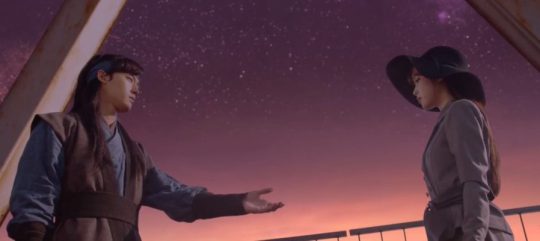
Part 4: More Parallels and Discussion
The Husband is Rebuked by the Cruel One who Sent Him:
When Aphrodite learns that Eros fell in love with her enemy Psyche rather than dooming her to fall in love with a loathsome monster, she rebukes him as a failure. Aphrodite sees Psyche as a direct threat and is fearful of being usurped by her.
When Song Hwa finds out that Chung Myung has fallen in love with an enemy and has been in league with Man Wol’s gang of bandits instead of quashing them, she chastises him as a traitor to his country, then blackmails him into doing her bidding and rounding up the thieves. Song Hwa and her father view Man Wol and her thieves as an existential threat to their kingdom. Like Aphrodite, Song Hwa is afraid that she will be usurped by Man Wol in two ways: first, she is afraid of a resurgent Goguryeo overthrowing her kingdom; second, she views Man Wol as a romantic rival for Chung Myung’s affections.
The Beauty Repeatedly Rejects the Beast’s Marriage Proposals:
As there is strong overlap between Beauty and the Beast type stories and Animal Bridegroom stories, ATU-425 stories can be read in those terms. Just as how Eros was the one who was pricked by his own arrow at the sight of Psyche, the Beast is the one who falls in love with the Beauty first, whereas the Beauty only starts to fall in love with him as she sees past his veneer and looks into the man who is inside. The couple’s momentary bliss, however, cannot last, as the Beast is not ready to let go of his brutish exterior. When he clings to his literal or metaphorical beast-form, the Beauty must reject him. (Think Jane fleeing Rochester after his bigamy is discovered in Jane Eyre.) It is only after he makes some kind of self-sacrifice on her behalf, often involving a literal/metaphorical death and rebirth, that the Beauty finally professes her love to him. Often this declaration of love is all it takes to heal him from the brink of death.
Man Wol rejects Chung Myung’s “marriage proposals” on three separate occasions. First is when he offers to run away with her when she is about to leave to join the rebellion.

This botched proposal is prolonged; Man Wol initially rejects Chung Myung, but when he leaves the signal to meet at the lake, two details imply that, had she arrived on time, Man Wol may have changed her mind: 1) As mentioned previously, Yeon Woo seems to doubt that Man Wol will return from bidding Chung Myung a final adieu, and 2) while wallowing in self-loathing and speaking to a past version of herself, modern-day Man Wol says that she would have been happy to have received the metal brooch Chung Myung intended as a gift for her. Regardless of whether Man Wol would have changed her mind or not, Chung Myung’s attempts to risk his life and elope with Man Wol fail, and we see how things go horribly awry when the princess arrives at the lake to confront Chung Myung before Man Wol can reach him.
Man Wol rejects an overt insinuation of a marriage rite during her confrontation with Chung Myung in the chamber where the royal marriage was supposed to be consummated. He invokes the image of them as the true bridal couple by referring to Man Wol as “a beautiful bride” whom he missed and wished to caress. She is not receptive to this and reasserts her blade against his neck.
The last time Man Wol rejects Chung Myung’s hand in a metaphorical marriage is on the bridge to the afterlife.
The first of these botched proposals happens due to Man Wol’s hesitancy, fears, and doubts, as well as Song Hwa’s interference.
The second rejection in the bridal chamber is the most mythically consistent because Chung Myung is already wedded to a death threefold—1) Song Hwa as the Death-bride, 2) the imminent physical death promised to him by Man Wol, and 3) the spiritual death of living as a traitor to himself and his desires. Also, while Chung Myung’s undying love for Man Wol is on full display in this scene, at this point, he can be interpreted as still clinging to his snake-form since he continues to provide Man Wol with no explanation for his actions.
In choosing Chan Sung over Chung Myung, Man Wol only accomplishes one of these things. She turns her back on her painful past, closing that chapter in her life. But her choice does not lead to lasting joy, at least not in that lifetime, as shortly thereafter she must depart for the afterlife herself and leave Chan Sung behind. Furthermore, Man Wol’s love with Chan Sung makes no statements about an older versus newer way of doing things because Chan Sung is from Man Wol’s present. Chan Sung represents a fresh start for Man Wol unfettered by her personal past, but he does not necessarily represent a rejection of the precepts of the past more broadly.
As for the last, after 1300 years Chung Myung has finally gone through his transformation and is restored from a firefly back into a man. Man Wol rejects him on the bridge, not because he is still part-Beast, but because she has fallen in love with someone else—a departure from this story structure. This is the point at which the mythical couple, now more worthy of each other after their trials and tribulations, is typically joined in an alchemical union which gives birth to “joy” along with freedom from the pains of the past and the older generation’s way of doing things.
Compare this to a reunion with Chung Myung that would have transcended time, death, clan, class, war, ill-fate, heartache, misunderstanding, resentment, and all the other seemingly insurmountable obstacles, both manmade and metaphysical, that stood in the way of this couple’s happiness. A happy ending for this couple would signify that love is more powerful than any obstacle, that true love finds a way even when there seems to be none, and that a love that is forbidden in its time is only considered taboo due to the small-mindedness of people.
On the Bridal Chamber Scene:
I just wanted to elaborate more on how this scene merges the wedding and funeral rites. Man Wol attempts to kill Chung Myung here, but when she hesitates, he takes his fate into his own hands and sacrifices himself by running himself through. Apart from this literal self-sacrifice, Chung Myung also puts his own wants and needs aside in favor of Man Wol’s by saving Chan Sung on the tunnel to the afterlife and facilitating his reunion with Man Wol.
The final duel between Man Wol and Chung Myung takes place in the room where a marriage was supposed to be consummated. After killing Song Hwa, Man Wol disguises herself in Song Hwa’s bridal garments, clearly playing upon the idea of a false and true bride. Song Hwa’s bridal gown is rightfully hers, but in terms of her marriage to Chung Myung, she is only dressing the part. Meanwhile, Man Wol’s appearance in these bridal robes is false—it’s a ruse—but at heart she is Chung Myung’s true bride.
I find the decision to don the bridal attire on Man Wol’s part fascinating. Even if it wasn’t her intention, it’s as though she’s claiming her rightful place as Chung Myung’s intended bride. She even goes to the trouble of unveiling herself in the same way that Song Hwa did when she expected to be greeted by Chung Myung.
Even if on a conscious level, Man Wol only wore the bridal garb in order to catch Chung Myung off guard or to vindictively shove in his face what they could have been, her “disguise,” on some level, reveals her true aspect. Man Wol may, in a literal sense, be merely occupying Song Hwa’s place in the royal bedchamber, but in this same act, she is refusing to let Song Hwa supplant her at Chung Myung’s side. Ultimately, Man Wol’s effort to catch Chung Myung off guard backfires because he uses it to garner her sympathy and demonstrate that he still loves her.
Furthermore, after Chung Myung breathes his last, Man Wol is left feeling shocked, hollow, and empty. It might have been easy to miss, but she appears to mourn his death. She even sheds tears for him, and perhaps, for herself and what she’s become.
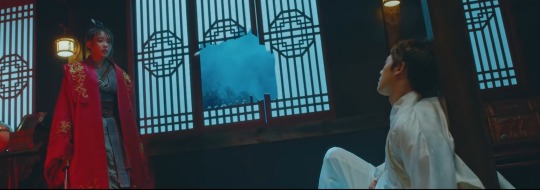
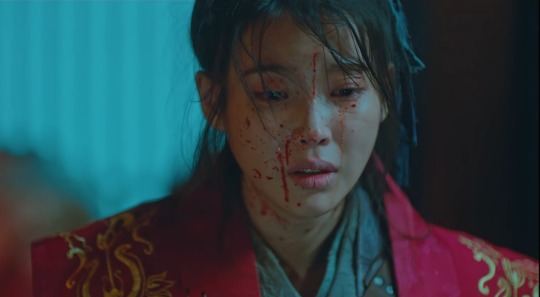
This isn’t the triumphant face of someone who just enacted her long-awaited revenge over an enemy; this isn’t even the face of relief over not having to kill someone she wasn’t sure she could bring herself to kill. This is the face of mourning.
I might be wrong about this, but the music that plays over their final exchange of words is reminscent of Lacrimosa from Mozart’s Requiem. This dirgeful piece of music is part of a funeral mass setting. Additionally, this piece of music is associated with the following sculpture by Antonio Canova.
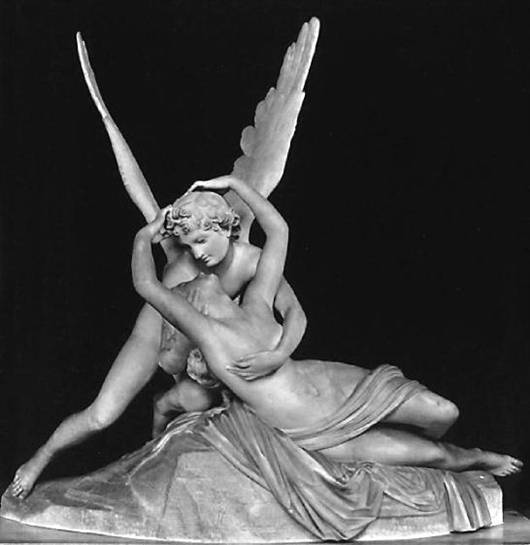
[Psyche Revived by Cupid’s Kiss]
This famous sculpture depicts the moment when Eros revives Psyche from the Sleep of Death.
Was the choice to evoke this particular piece of music composed for funerals and associated with the Eros and Psyche myth over the bridal room scene simply a coincidence? Honestly maybe, I might be reaching with this connection ahaha.
Beethoven’s famous Moonlight Sonata then starts playing as Chung Myung’s hand reaches to hold the back of Man Wol’s head. This song also notably has the somber character of a funeral march. These same notes are played during the opening sequence of the show as Man Wol travels with the coffin containing the trinkets of her deceased friends in search of the Guest House of the Moon, which is a kind of funeral procession.
Healing the Wounded Masculine:
The heroine’s ability to save her lost husband from a dark or deathly fate is a testament to her power and the strength of her love. This can be read as a literalization of the point in Murdock’s Heroine’s Journey at which the wounded masculine is healed then subsequently integrated with the feminine in a “sacred marriage” that transcends the masculine-feminine duality.
Man Wol already acts to heal Chung Myung by letting go of her resentments toward him and accompanying him on the bridge to the afterlife. She saves him from an eternal spiritual death in the form of vanishing, thus healing the outer wounded masculine (Chung Myung). Man Wol’s self-loathing could constitute her inner masculine that needs healing as well. It can be inferred from the scene in Episode 14 in which Man Wol talks to a past version of herself that she blamed herself for the death of her people and believed that she was foolish to have ever fallen in love with Chung Myung. The curse that she creates for Chan Sung when she suspects he is Chung Myung’s reincarnation takes the form of a shadow-version of herself.
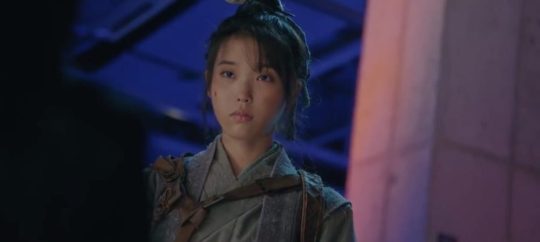
This deep bitterness that Man Wol harbors for her past self is presumably destroyed along with the metal ornament when it is dissolved by her tears at the end of her long-awaited meeting with Chung Myung—note how this differs from the recognition motif in which the heroine shows her mythical husband a gift he had once given her, and then he recognizes her as his one true bride. In this way, the shadow-version of Man Wol, her wounded masculine, is resolved by coming to accept that Chung Myung truly loved her and wasn’t playing her for a fool the whole time. This point would have been spelled out further if Man Wol accepted and returned Chung Myung’s love—if both the outer and inner halves were integrated in a “marriage.”
A Refusal to Live in the Dark:
Psyche’s refusal to live in a state of childlike ignorance/dependence is what launches her out of a state of unconscious and onto her journey. Eros likewise spends much of the story under the thumb of his overbearing mother, and he, too, must undergo a journey toward individuation. Eros and Psyche’s stories complement each other, and they must overcome similar flaws in temperament.
Man Wol launches herself into consciousness by choosing to join the rebellion. No longer satisfied with a life doomed to be cut short, she rejects her life as a thief and takes steps to achieve longevity past her youth. For Chung Myung, refusing to continue living a lie means pursuing his love even unto death, defecting, and quitting serving a princess and despotic kingdom to which he holds no strong affinity. It means following his heart and returning to the land of his forefathers (recall that Chung Myung mentions that his family originally hails from Goguryeo and jokingly says that he and Man Wol could be kin—hence, his term of endearment for her is “nui” or sister).
Both must be courageous to extricate themselves from the false families they have built for themselves, even if it initially leads to pain. For these risks, they should be rewarded with a joyous reunion. Instead, their story ends in infinite separation which, in the language of a Search for the Lost Husband story, means that one of the two is still being punished.
Different Taboos Yield Different Endings:
Earlier, I alluded to the fact that ATU-425: Search for the Lost Husband tales more often end happily while their ATU-400: Quest for the Lost Bride counterparts usually end in tragedy. One explanation for this can be found in Barbara Fass Leavy’s observation that taboos imposed on mythical husbands and mythical wives are different. For this part, I’ll borrow the words of Tumblr user @allgirlsareprincesses from her post about The Death of Love and the Lonely Soul in TROS:
In her book on swan maiden tales, author Barbara Fass Leavy points out that the taboos imposed on mythical husbands are different than those imposed on mythical wives. Men, for example, are most often prohibited from abusing their fairy brides, while women are prohibited from looking upon their fairy husbands or knowing their true identity. Leavy states: “In general, taboos imposed on the wife in Cupid and Psyche tales are often intended to keep her in her place, to prevent her from achieving some autonomy by knowing who her husband is, seeing him, or being able to disclose his identity to others.”
As these taboos are reflective of a patriarchal context, the difference in these taboos suggests an inherent imbalance in the relationship between husband and wife. Men are instructed not to abuse their power, whereas women are advised not to challenge their husbands’ authority or demand a more equal relationship. However, what is subversive about these fairy tales is that, despite breaking these taboos and challenging male authority, the women in these stories ultimately defy death. They are able to recover their lost husbands and are even elevated to royal/divine status for their courage and tenacity, thus entering into more equal marriages with their husbands.
In Man Wol and Chung Myung’s relationship, there is a clear power imbalance. As a bandit, Man Wol is on the wrong side of the law, and as a lowly migrant, she lives on the margins of her kingdom in a constant state of instability and upheaval. Meanwhile, Chung Myung, while originally of a humble migrant background, rose through the ranks to captain an arm of the kingdom’s military. He is the one in a position of power, power which he initially wields to protect Man Wol but is soon twisted against him. And yes, while Man Wol herself is the leader of her clan, her authority’s legitimacy pales in comparison to Chung Myung’s when he is favored by the princess and aligned with the royal crown.
This power imbalance is leveled on the night of the royal wedding. Chung Myung’s power is stripped from him in death as he is transformed into a pitiful firefly. Man Wol, a woman on the run, is on her way to a kind of death that awaits her as the owner of the Guest House of the Moon. Frozen in time, Man Wol becomes ageless. Unlike the immortality that is granted to Psyche which unites her to Eros as equals, Man Wol’s immortality is an everlasting punishment. Still, as owner of the Guest House of the Moon, Man Wol gains some special abilities which are showcased throughout the course of the show. She is able to influence the fate of Chan Sung’s father who appears to her on the verge of death and is able to magically protect Chan Sung at several points.
When Man Wol finally says Chung Myung’s name, he briefly appears to her as he did in his life as man without armor. It is during this long-awaited encounter that the petals of the Moon Tree fall, indicating that Man Wol has regained her mortality and must serve as the owner of the Guest House no longer. Afterward, Chung Myung is transformed back into a firefly, and he is not strong enough to make it to the bridge to the afterlife on his own. He is at the mercy of Man Wol who, after letting go of her ill-will toward him, agrees to accompany him to the afterlife. On the bridge crossing the Samdo river, Chung Myung appears as a man once more. He reaches his hand out to Man Wol and offers her the option to move onto the afterlife together, united in death on equal footing at last.
Part 5: Chung Myung and Man Wol as Orpheus and Eurydice
I’ll try to keep this section brief since this post is already way too long as it is. As mentioned previously, when the gender roles in a Search for the Lost Husband story are reversed, the tale more often than not ends in tragedy. So, since the love story between Jang Man Wol and Go Chung Myung is a tragic one, it can fairly easily be read as a Quest for the Lost Bride-type story. The famous version of this story in Greek mythology is the tragedy of Orpheus and Eurydice. While it bears some similarities to the Eros and Psyche story, including a treacherous trip to the Underworld, Orpheus and Eurydice centers a masculine perspective as opposed to a feminine one.
In the Greek myth, the union between Orpheus and Eurydice is doomed from the outset. Hymen, the god of marriage never blesses their wedding. In other Lost Bride tales, the powers that be may forbid the union (due to caste, clan, parent’s wishes, etc.) so the marriage must take place in secret.
After being bitten by a venomous snake, Eurydice dies and descends to the Underworld. In other Lost Bride stories, a separation between the husband and wife pair occurs when the wife dies during childbirth or after a betrayal on the part of the husband at which point the bride retreats back into her animal/swan form. With the bride lost or trapped in the Underworld, the husband must begin his quest.
The devastated Orpheus wallows and roams the earth, playing mournful songs on his lyre. Our hero descends to the Underworld and appeals to Hades and Persephone to return Eurydice to him. They agree but tell him that Eurydice must walk behind him on their way out of the Underworld. Orpheus is warned that he must not look back at her or else she will remain as a shade in Hades forever.
The hero swears he will obey whatever condition is put upon him, but he ultimately fails. Orpheus gives into the temptation and looks back to see if Eurydice has lost her footing. This “look back” is the equivalent of the breaking of the taboo from Lost Husband stories; it signifies a loss of faith or an inability to resist the lure of power or another lover.
Unlike the Search for the Lost Husband which rewards its heroine for her persistence with passionate love, the Quest for the Lost Bride contains harsh punishment for the failures of its hero. Orpheus loses Eurydice forever, and upon returning from the Underworld, he is torn to pieces by followers of Dionysus. His head floats down a river to the island of Lesbos to always sing sorrowful songs.
Another version of the Lost Bride story that I would like to highlight is from perhaps the most famous ballet of all time, Swan Lake. The ballet is about a princess named Odette who has been cursed by an evil sorcerer to remain a swan by day and a maid by night. The curse over Odette can only be broken if someone who has never loved before swears to love her forever. When the young Prince Siegfried, who has just come of age, stumbles upon the enchanted lake where Odette resides, the pair falls in love. Siegfried invites Odette to the ball his mother is holding the following evening in which he is supposed to select his bride.
At the royal ball, Von Rothbart, the evil sorcerer who cast the spell on Odette, arrives in disguise along with his daughter Odile who has been transformed to look like Odette. Thus, Prince Siegfried unknowingly pledges his troth to the villainous Odile rather than his true love Odette. Odette, who arrives just in time to witness this, retreats back to the titular swan lake, doomed to remain a swan forever on account of Siegfried’s betrayal.

Despite these Lost Bride/Swan Maiden stories ending in tragedy, variations exist that end on a happy note. In some versions of Orpheus and Eurydice, Orpheus descends to the Underworld for good and is reunited with Eurydice, to spend eternity together, hand-in-hand. Similarly, some versions of Swan Lake end with a double suicide that vanquishes evil, breaks Rothbart’s curse over the other swan-maidens, and results in an apotheosis for Odette and Siegfried who are eternally united in death.
Although different productions of Swan Lake contain vastly different endings, the original ends in tragedy. In versions with a tragic end, Prince Siegfried is killed in his final struggle with Rothbart, or Odette permanently becomes a swan while the grief-stricken Siegfried remains alone at the story’s conclusion.
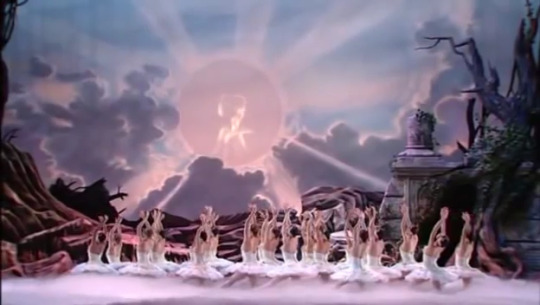
The apotheosis from American Ballet Theatre’s 2005 TV version of Swan Lake.
So, how do these stories relate to Man Wol and Chung Myung’s? Well, first, it’s clear from even the very first minutes of Hotel del Luna that Man Wol’s love with Chung Myung is bound to end poorly because the show opens with Man Wol being doomed to keep the Guest House of the Moon as a punishment for killing numerous people. The mystery that unfolds throughout the course of the show is exactly what drove her to kill so many, and the answers we’re given about Man Wol’s past are all tied to Go Chung Myung.
The inciting event that takes the place of the wife’s tragic death or husband’s infidelity is Chung Myung’s betrayal of Man Wol. Like Prince Siegfried, Chung Myung fails to pledge his troth to his true love and instead pledges his loyalties to the false-bride Song Hwa.
It is after this betrayal that Man Wol returns to her ‘enchanted’ form, that is, in contrast to the true self that the ‘prince’ Chung Myung had drawn out of her, Man Wol resumes her inauthentic aspect as ruthless bandit. After slaying the false-bride along with countless others, Man Wol becomes trapped in the Underworld (the Guest House), and her treacherous lover joins her shortly thereafter.

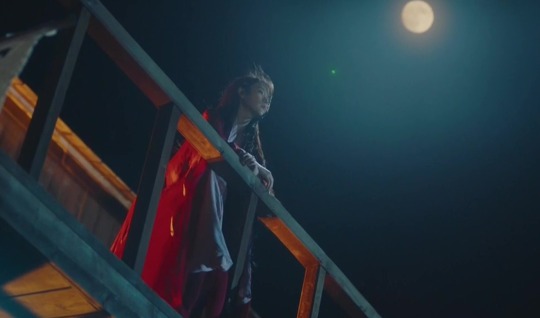
Chung Myung’s persistence in remaining at Man Wol’s side as well as Man Wol’s refusal to budge after all those years appeal to Mago, the ruler of this Underworld, and cause her to create the conditions that bring Koo Chan Sung to the hotel. It is Chan Sung’s entrance into Man Wol’s life that leads to her confronting her past and her eventual reunion with Chung Myung.
However, the power imbalance that we saw in Search for the Lost Husband tales is not entirely absent in their Quest for the Lost Bride counterparts. When Lost Bride tales are retold from a particular masculine perspective, the happy ending often predicates upon the husband successfully subjugating his wife rather than a marriage of two lovers as equals.
When Man Wol reunites with Go Chung Myung, he appears to her in his humble attire without his armor and says few words, accepting her decision to let go of her resentments toward him while she insists that it's time for him "move on" to the afterlife. Man Wol forgives Chung Myung, but she doesn't welcome him back with open arms, and subsequently declines his invitation to move on together. Chung Myung takes a more passive role in these interactions, so I don't really get the vibe that a happy ending between him and Man Wol would have predicated on him subjugating or dominating Man Wol. Man Wol is able to let go of her grudge toward Chung Myung, but they were ultimately unable to rekindle their love.
Alright, it's high time to wrap this up. On a closing note, I would like to say this is just one lens through which this story can be analyzed. My analysis focused on the historical subplot of Hotel Del Luna which is only one of its many concurrent storylines. You can easily read the overarching love story between Man Wol and Chan Sung as a gender-swapped Beauty and The Beast story with Man Wol as the cold and conceited "Beast" who holds Chan Sung's father hostage in episode 1 only to spare his life in exchange for his son's servitude, the Moon Tree as an analogue to the magical rose, and the Hotel del Luna serving as the Beast's enchanted palace.
I hope you enjoyed this long-winded meta, and if you made it this far, thanks for reading <3
#hotel del luna#hotel del luna meta#jang man wol#go chung myung#jang man wol x go chung myung#search for the lost husband#atu 425#eros and psyche#aarne-thompson-uther 425#animal as the bridegroom#fairy tale meta#sorry about the sepia filter on some of these gifs
4 notes
·
View notes
Text

Come Home Never live used my home anymore a lot my grandson ago he used it back to ewa beach apartmnet home always accept it okay yes 2017 2023 2018 2021 Kirby cran Krady crestmere Tony Kasacro Come My Way DOA Alive 5 ugly eek Dugly Eekenk Trekkend okay Yes quit it nobody never hurt my grandson 22 years old to not all them us not healthy never no more again okay yes Bobby Raecren English French German Canada vs Japan Japanese Korea Korean China Chinese It's Italy Romanian Miani DJ Spyroof always Hate Mark Black guy James Dess ray Whore Punk Wipe crack face crutkipe Bratwipe okay Yes Leave My Grandson alone you stupid care nurse no good at castle no good anymore not more again Craymen Raymen Pin always his Mom accept available sometime do not lost him mother grandson 22 year old anymore Im he give to him Pocket dirt rock him Makeover okay Yes make him beat him window glass throw him makeover okay yes Like my Mom Rey Pin say Hi to Grandson Craymen Racren always accept okay yes not all of them anymore never follow the staff never again okay yes ive tell them fucking whorewipe Punkwipe okay Yes Ma Danny yes. Mhm 2006 2007 2016 2017 Bring Grandson come home to ewa apartment 101 91-1671 Joseph Lucas Joe Lucas Vance Ft Uncle waene Vietnam Vietnamese not Philipine Philipino never again a lot too much Not any Minutes and Whole Hours ago anymore okay Yes GTA 5 Blue White Red Purple Lavender Tan Plaid Shirt Polo Western Ribbon Neckite i love DJ song okay yes Guardian family like Raymen does always ago dont over sleep now again just stay still ok. American European Asian Boy Male Man Men guy Young Teen Not Girls no Women ladies Female anymore okay Yes gotta stay strong bro okay Yes Phone a03s always have to used back over sametime back again soon okay Yes Hate Salverdor Talk Upset his problem get a grip person said quit it you two just cut it out you too a lot en it You no longer to my boyfriend okay Yes Doobi Doo Dont be Shy Yes Dance Pop Indie Rock Crying Sad song Relationship okay Yes Park Yoochun Jo in sung So ji sub Lee Hoya Lowon Sophie Monk Namie Amuro Milky Way Hate Grudge and Ring no good From Ghost Shotgun okay #RaymenPin #Kirbycran #ParkYoochun #Joinsung #Sojisub #Hilaryduff2004 #Comemyway #Ewabeach101 Bae Sung Woo Jung woo Sung not Ryu Jun Yeol just Park Sung Woong and Son Hyun Joo Lynda Trang Dai Sadness together be happy always a lot okay back come heaven come praying milky way starry healed Raymen bro okay Yes 김현우 #김현우 #KBS #MBC #SBS #SophieMonk #LilouBboy #LeifangJacket #Lyndatrangdai17 #더킹 2017 2023 더킹 #소피몽크 #박유천 #조인성 #손현주 #배성우 #소지섭 #박성웅 #김사홍 Kim Sa Hong Gay Love Drama Loveless no more Homeless anymore not more to alan My Mom never like you not more to you alan Youll stay away my Mom and Brother they accept me to Healthy Home ewa okay Yes Alan we all kleep are mouth shut okay yes. ホール マイ エワ Rainbow angelic Russian France Colby Rank Facewipe Princess Headdress Mary Jane Shoes White Pants Stocking Short Loafer Ribbon Not Superman Batman anymore again okay Yes American Hawaii Home Christmas Help ok Iceman Cyclops Bobby Drake Scott Summers Pasha and Yutaro Same Love Male Bro always love same back Couple love gather same over back again okay Yes Asshalfbraidwipe 蘇楷盛 ដា រ៉ូ សំណាង បឹងព្រីង ប្រុស ពៅ Blonde Ginger Hair Bald Short Left Side cute okay Yes Brandon Routh Embrace hate Cartoon network Jannlee Rig bayman leon Akira Jacky Zack Ein Male Xtreme Take it easy okay Yes Hate it here kaaka st village park no good safe again okay Yes Uncle waene bro buddy okay Yes 😭👌🏻🤗💙📱🎀🧊 Tu vivi nell aria Return accept KBS MBC SBS TVN JTBC KBS2 Phi Viet Volume 11 Aaron Shawn Ashmore Hames Marsden Iceman Cyclops Bobby Drake Scott summers Logan Lerman Dylan Everett #Tuvivinellaria #DoobiDooDontbeshy #Tonykasacro
2 notes
·
View notes
Text

📰 IZE: "Finding the Hidden Shim Soyoung," 'Crash' Made Interesting by Her Incredible Presence
<"Ah? Where have I seen her?">
Among actors like Lee Minki, Kwak Sunyoung, and Heo Sungtae, there is one who offers delightful moments of entertainment. Like a graceful figure from a dream, she leaves a lingering image. She is actress Shim Soyoung.
Shim Soyoung has been flaunting her strong presence since the premiere of the ENA Monday-Tuesday drama 'Crash' (directed by Park Junwoo, written by Oh Sujin) on the 13th. She is a special existence that pulls interest among the main actors, including Lee Minki, Kwak Sunyoung, and Heo Sungtae.
...Shim Soyoung has appeared in different roles from episodes one to four. In episodes one and two, she was a restaurant owner; in episode three, a shaman; and in episode four, a mother of a victim in a case. Her appearances have become a hidden spectacle of 'Crash.' Saying it's like "Finding the Hidden Sim Soyoung wouldn't be an exaggeration. Despite her brief appearances, she captivates viewers every time she appears. In episode three, she startled the main characters as a shaman, and in episode four, she delivered a powerful performance as a mother crying after discovering a secret about her daughter. Her crying scene in episode four was particularly immersive.
Thus, among the leading actors, Shim Soyoung shines as a 'scene stealer.' There's much anticipation for the roles she will take on in upcoming episodes.
There's a hidden point about Shim Soyoung's appearances. Those who have seen the credits might have noticed it. She appears in 'Crash' as a special guest and will continue to meet the audience in this capacity until the series finale (episode 12).
A 'Crash' staff member told Ize, "Actress Shim Soyoung perfectly embodies a variety of characters. That's why the production team asked her for a special multi-character appearance to add a hidden fun element to 'Crash.'"
Shim Soyoung, with her special presence, is a theater-trained actress who first made a mark with the audience by appearing as a mysterious figure in the 2020 tvN drama 'Tale of the Nine Tailed.' Later, in 2021, she played the role of Lim Bokja in SBS drama 'Taxi Driver' (Season 1), earning significant acclaim as 'Madame Lim.'
...Despite her brief appearances, actress Sim So-young leaves a deep impression. In 'Crash,' she elevates the viewing pleasure with "Finding the Hidden Sim Soyoung." She is the ultimate 'scene stealer.'
Crash, 2024
2 notes
·
View notes
Text

Prompt number: Day 3 - "Okay, show me."
Fanfiction Fandom: The Devil Judge (TVN 2021 K-Drama)
Pairing: Yohan x Gaon (M/M)
Rating: Teens and Up
Warnings: Mention of Suicide. Contacting with the Dead. Some Violence. A Kiss.
Additional: Supernatural AU. Yohan being a supernatural creature. Gaon being Investigative. Making a Bargain.
Excerpt:
Gaon, having lost his mother due to some false psychic scamming her with their fake spirit manifestations. Making it his mission to expose each and every fake he could get his hands on. Only to encounter the real thing in the form of Kang Yohan.
5 notes
·
View notes
Text
There’s a relatively new Korean word that didn’t exist when I was a kid: umchina/엄친아, which is a portmanteau for 엄마 친구 아들/umma chingu adeul, or mother’s friend’s son. The idea is that while this 엄친아 may not even exist in real life, he is the ideal person who Korean children are constantly compared to.
This August, Jung Hae-in will star in a tvN K-drama called “Mom’s Friend’s Son” or … “엄마 친구 아들.”
What I find appealing about Jung is that while he has a boyish quality that works well in the romance genre — really selling the emotions, he’s also stellar in action thrillers where you’re never sure if he’s the hero or villain.
#Jung Hae-in#Kdramas#Kdrama reviews#umchina#엄친아#DP#While You Were Sleeping#Tune in For Love#Somewhere in the Rain#One Spring Night#Jung Hae-in's Travel Log#I wrote this#Substack#Substack newsletter#Substack writer
3 notes
·
View notes
Text






Kdrama: Love Next Door (2024)
Aww, He Just Can’t Leave Her Like This 💔🥺 Love Next Door 🦋 #kdrama #junghaein
Watch this video on Youtube: https://www.youtube.com/shorts/qeBkPAPk4o0
#Love Next Door#엄마 친구 아들#Golden Boy#Mother’s Friend’s Son#My Mom's Friend's Son#Mom’s Friend’s Son#Eomma Chingu Adeul#Eomchina#엄친아#2024#tvN#youtube#shorts#short video#kdrama#Korean drama#Jung Hae In#Choi Seung Hyo#Jung So Min#Bae Seok Ryu
18 notes
·
View notes
Text
2023 kdrama list
list of the kdramas i watched and loved in 2023
obviously this is quite late but to those who want to start a kdrama, this is it.
#10 - soundtrack #2

there is such a comfort in the soundtrack series. even soundtrack #1 was so good, but this new instalment, truly works on the og kdrama tropes. lovers to exes to accidental 'fate' encounter to forced proximity to lovers again. puppy dog male lead, angsty female lead, jealousy, wholesome second lead, it's got it all. and ofc, music.
#9 - king the land

many people did not like this drama. honestly, if you're watching a kdrama that is romance and comedy then why would be angry that it had romance and comedy. again, a true example of a classic kdrama, rich ceo guy with hardworking girl, mix in some trauma and employee-employer drama, and this is the perfect clichéd drama.
#8 - see you in my 19th life

honestly i just like watching ahn bo hyun. he is such a pretty man. storyline-wise, i feel like they did a lot of stuff, but the ending honestly disappointed me. shin hye sun, as usual, love the woman, what an actor, the second leads also did not disappoint, loved them all.
#7 - crash course in romance

such a heartwarming drama. choi chiyeol with the temperament of a wet cat, the stress of studies in all asian countries, not just korea. all the romances were so cute (barring the best friend and brother). one thing they could have done better was cast a younger actress for the female lead. even this love triangle was so cute and fun.
#6 - my demon

song kang and kim yoo jung really killed it with the chemistry. i mean, forget everything else, i'll just take 16 episodes of them hanging out. even behind the scenes reels will work. the plot was pretty solid, felt like a remake of doom at your service. song kang does a wonderful job at being both goofy and serious, and kim yoo jung did so good at the angsty ceo.
#5 - the good bad mother

am i surprised this ended up higher than my demon? yes. this was such a good show, the past and present layered together so beautifully. the villains seemed like actual villains, but you weren't sure who to hate until the last episode. really shows some aspects of motherhood through both the eyes of the kids and mothers. had a cute little romance as well.
#4 - the worst of evil

ji chang wook and wi ha jun. need i say more? i have said it once, and i'll say it again - so few do action like koreans do. i mean, vincenzo, my name, midnight runners, and now this, such action masterpieces.
#3 - daily dose of sunshine

park bo young wa sso cute in this one. i miss small kdramas with intense plots. mental illnesses were dealt with very well in this one. the romance was so cute, and chang ryul, my baby, i missed him so much.
#2 - alchemy of souls s2
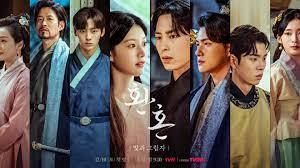
i just. love. this series. so much. like, the characters are so well built, the storyline, the romance, the destiny, oh my god. please watch this.
#1 - welcome to samdal-ri

this comes as a surprise to absolutely no one. what a feel-good drama to end 2023. it was the perfect remix of hometown cha cha cha that we all needed. ji chang wook, my absolute gem of a man, and shin hye sun, queen of no shit given but too many shits given roles. adore the friendships, romance, calm setting, the love between everyone. please watch it.
#kdrama#korean drama#kdrama review#review#tvn netflix#kdrama text post#kdrama recommendations#shin hye sun#welcome to samdalri#ji chang wook#alchemy of souls#lee jae wook#daily dose of sunshine#the worst of evil#wi ha jun#park bo young#the good bad mother#my demon#song kang#kim yoo jung#crash course in romance kdrama#crash course in romance#see you in my 19th life#king the land#lee junho#im yoona#ahn bo hyun#soundtrack 2
25 notes
·
View notes
Text
speaking about hanseo being hyperfixated on bugs and moths, boys will be bugs by cavetown is so hanseo coded, but especially in terms of bug lover hanseo proof:


do you see the vision
the highest hanseo has ever scored on a test was the raadsr test btw and i stand by this
#i want to draw moth hanseo fanart now#if only i knew how to drew moths#autistic hanseo#jang hanseo#tvn vincenzo#he WILL infodump to you about spiders specifically#he loves the unlovable#because he believes he himself is the unlovable#he wants someone to love him the way he loves the hated#everyone is fearful of him#while not knowing the truth#he wants to be saved and treated with the same love gentleness and care he gives a spider#when he carefully picks it up between a glass and paper underneath#he gives love not only to everyone around him no matter how undeserving#but also to the creatures around him#he is so painfully human#yet he's treated like a monster#he has horns on his head#and because of that he is outcasted from society#and instead finds comfort in other animals with horns and the little creatures with antennas that also remind him of horns#even if he is left to rot by humanity#the moss will lovingly shade and hug his tired body#so at least rotting away wont sting as much#because even if he is withering away in the green he at least now has a home#he has a bed to lay in#even if they dig him a grave and put him in alive#he will not be alone#he'll be surrounded by the only friends he ever had#the dirt of the grave shields him and embraces him#it's warm like a mothers hug
16 notes
·
View notes
Text
Mouse (2021) Ep. 1 Recap
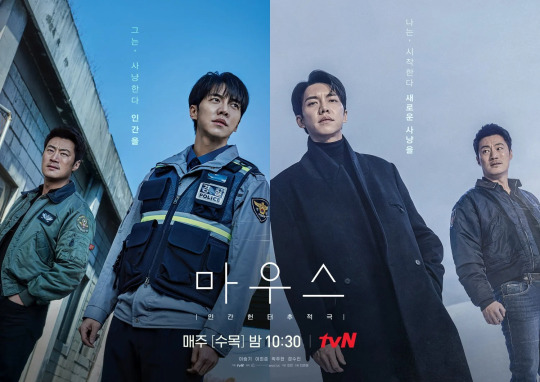
Mouse (Korean: 마우스; RR: Mauseu) is a South Korean drama television series starring Lee Hee-Joon, Lee Seung-Gi, Park Ju-Hyun, and Kyung Soo-Jin. It premiered on tvN on March 3, 2021 and aired every Wednesday and Thursday at 22:30 KST until May 20, 2021.
Mouse imagines a scenerio where psychopaths could feel remorse and guilt for their actions. The story follows Go Moo-Chi as he tries to catch a psychopathic killer. He witnessed a horrific incident as a child and is dealing with the trauma. Together with his younger partner Jeong Ba-Reum, he tries to uncover the truth behind psychopathic behaviour and to answer the question of whether there is a genetic predisposition to psychopathy - and how to act on this knowledge if it could be detected.
EP. 1 The country is struck with terror as news of an unsolved serial killing case spreads. A family of four visits a campsite and tragically falls victim to the serial killer known as Head Hunter. A boy surives the attack and identifies the prime suspect as the killer. Meanwhile, Head Hunter's baby undergoes a gene test to determine potential psychopathic characteristics, and the mother is faced with a difficult decision.
If you want to watch the series for yourself, stop reading! This post contains spoilers to the storyline.
During a visit to the zoo, a classroom of children observed a large black snake in a glass enclosure. One child, who appeared emotionless, secretly released a small rat into the enclosure. The snake immediately attacked the rat, causing the other children to flee in terror. The child who released the rat remained to watch as the snake attempted to catch the rat, but was ultimately bitten in self-defense. The snake shakes off the rat. The rat turns and launches itself at the snake again, its eyes shining red.

Five years later, the same boy enters an empty church to ask an important question of the stained-glass Jesus. He asks, "Do I seem different to you, too? They say it's how I was born. They say I was born different." But no answer comes.

Ten years earlier, a young woman is dropped off by a taxi at the bottom of a steep hill in the middle of a snowstorm. She uses a phone booth to call home and explains that the road was too icy for the taxi, so she will be walking the rest of the way. As she hangs up, she hears a plaintive voice calling out for her. There is a small girl in the road who cries that there was an accident and her father is still in the nearby car. The young woman approached the car. When she opened the door, the driver attacked her. She begged for her life in vain. Nearby, the little girl sobbed at the violent scene.
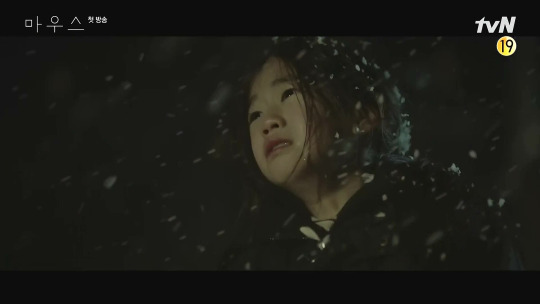
A week later, a diver discovers the headless body of a young woman in the ocean. The victim has a series of letters and numbers marked on her hand and is identified as the latest victim of the Head Hunter, a serial killer.
In England, a year later, scientist Daniel Lee gave a lecture where he identified a gene present in the DNA of psychopaths, a personality disorder characterized by a lack of empathy for others. Daniel predicted that we will soon be able to predict whether an unborn child might be a murderer based on the presence of this gene.

The president calls Daniel back to Korea to stop the Head Hunter's killing spree. During his speech, Daniel presents his DNA findings, revealing that one percent of people with the psychopath gene become murderers. However, his test has a 99% success rate, with the remaining 1% indicating that the person will be a genius. The genes for genius and psychopath are so similar that it is difficult for Daniel to differentiate between them. Eliminating psychopaths could also mean killing potential geniuses. The question at hand is whether the government can require a mother to have an abortion if the psychopath gene is detected. Ultimately, the proposal is rejected.
That evening, Daniel visits his old friend Han Seo-Joon, whose wife Ji-Eun is heavily pregnant with their first child. Seo-Joon and Ji-Eun are clearly in love, with Seo-Joon doting on Ji-Eun and Ji-Eun returning his affections. However, Daniel feels a bit sad when he sees their wedding photos. This is because Seo-Joon's first love was Daniel's sister, Jennifer, who died seven years ago in a random mugging. When the subject comes up, Seo-Joon appears sad, but Daniel insists that he is thrilled to see Seo-Joon married and happy. Seo-Joon drives Daniel to his hotel and promises to visit him in England soon.

A family of four is traveling through the area. They get briefly lost and ask another driver for directions. They stop at a campground for the night, but unfortunately, the ceiling in the kitchen caved in from the snow, so the campground is closed. Despite this, the family decides to stay and rough it. The father is searching for the mother who is away getting water. He hears his wife crying out. An ominous figure with a knife looms over her as she pleads for her life. Her husband jumps at the attacker and yells for her to run. She races back to their van with their boys, Moo-Won and Moo-Chi, but the van won't start.

The attacker approaches, so she pushes the boys down to hide. She instructs Moo-Won to protect his little brother and hide with him in a cupboard. After uttering a small prayer, she goes out into the night.
The boys hid, but the attacker soon reached the van and attempted to break in. The mother distracted him and led him away from the van, but unfortunately, she was caught and stabbed multiple times. Despite her best efforts, the attacker quickly overpowered her and returned to the van, where the boys were now out of hiding and screaming for their mother. Moo-Won then locked little Moo-Chin into a suitcase and shoved it under a bench before attempting to hide himself. The attacker found Moo-Chi's suitcase first and began breaking it open. Moo-Won remembered his promise to protect his little brother and came out of hiding to lead the attacker out of the van. However, the attacker caught him and repeatedly hit him.
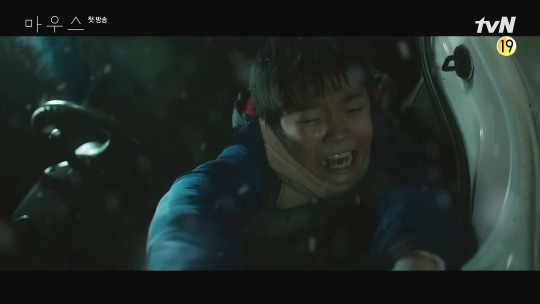
Later that night, Detective Park Doo-Seok was called to the hospital to speak with young Moo-Chi, who was in deep shock. Moo-Won is undergoing surgery due to severe injuries. His parents were murdered, but their bodies have disappeared. Detective Park, whose daughter was also abducted by the Head Hunter years ago, pressures Moo-Chi to identify the killer's face. When Moo-Chi is unable to speak, Detective Park becomes frustrated and scares the little boy even more. As he is being taken away, Moo-Chi sees something that causes him to scream. He points at a picture on the wall and yells, "It's him!"

Ji-Eun wakes up late and finds herself alone in bed. She goes out to search for Seo-Joon. He enters with an armful of firewood. Ji-Eun smiles at the family of snowmen he built in the front yard. Earlier, Seo-Joon had told Daniel that he would terminate the pregnancy if their baby had the psychopathy gene. However, Ji-Eun is uncertain about what she would do. Several police cars suddenly arrive at the driveway. Detective Park orders Seo-Joon's house to be searched and arrests him at gunpoint, growling that he is the Head Hunter. It turns out that the photo that Moo-Chi pointed out as his family's attacker was one of Seo-Joon, who is a neurosurgeon at the hospital.
While Detective Park was obtaining the search warrant, Moo-Chi took a scalpel from a discarded surgical tray and sneaked into the patrol car. In the ensuing confusion, he lunged out of the car and slashed Seo-Joon's face. He attempted to stab Seo-Joon again, but Detective Park intervened, accidentally knocking the head off one of the snowmen. The snowman's head shattered on the ground, revealing a black plastic bag inside. One of the officers peered inside, then dropped it in horror. Moo-Chi sees blood in the snow. He also sees the barrette his mother was wearing, still clipped around a lock of her hair. Ji-Eun witnesses this scene from inside, and the truth hits her like a ton of bricks.

The bodies of Moo-Chi's parents are eventually found in Ji-Eun's greenhouse, furthering the theory that Seo-Joon is the Head Hunter. Despite Detective Park and the families of the deceased being dismayed, Seo-Joon continues to protest his innocence and wish for the real killer to be found. Daniel assures Ji-Eun that Seo-Joon cannot be guilty because he loves her. According to Daniel, psychopaths cannot have love anyone but themselves. However, Ji-Eun confronts Seo-Joon in front of reporters, claiming that she knows he is guilty. She saw him putting the head on the snowman that contained his victim's head, and she even has a picture of proof. Seo-Joon's drops the innocent act, and a flashback reveals that he is the one who killed Moo-Chi's parents. Ji-Eun tearfully asks why he even married her if he can't love her. Seo-Joon sneers and replies, "I guess you could call it my will to reproduce. I needed an offspring. Han Seo-Joon Junior."
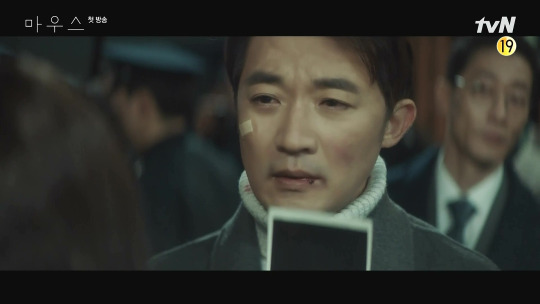
Floored, Daniel ran into the police station, grabbed Seo-Joon and flinging him into an interrogation room. He asked Seo-Joon if he killed his sister. Seo-Joon responded emotionlessly that she still hid from him after being stabbed twenty times. He threatened to kill her mother and Daniel if she didn't come out. Seo-Joon laughed at the memory of how she looked when she crawled to him. He snarls that she killed his baby and brags about keeping his promise not to hurt her family. He finishes his story by saying, "The pleading look in her eyes couldn't have been sexier," leaving Daniel sobbing on his knees.
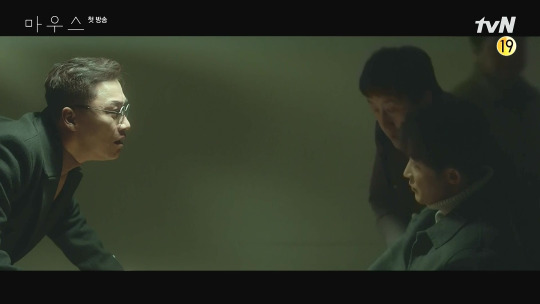
Daniel offers to run a genetic test on Ji-Eun's unborn baby, and she accepts. The results reveal that the baby has the psychopath gene, causing Ji-Eun to panic and demand an abortion. However, Daniel reminds her that she is too far along for that option and suggests they discuss other alternatives. In the hallway, a pregnant woman approaches Ji-Eun. She explains that her husband worked with Daniel in England. To help, she volunteered to have her baby tested. Her husband had told her that their baby was normal, but she found out that he had lied to her because he didn't want to scare her. Sadly, her husband died recently in an accident, and she is now faced with the decision of whether or not to end the pregnancy. The woman informs Ji-Eun that her baby is the only thing she has left of the father, who she believes was a good man. Therefore, she does not think her baby is a psychopath. However, Ji-Eun does not have the same assurance about her baby's father.
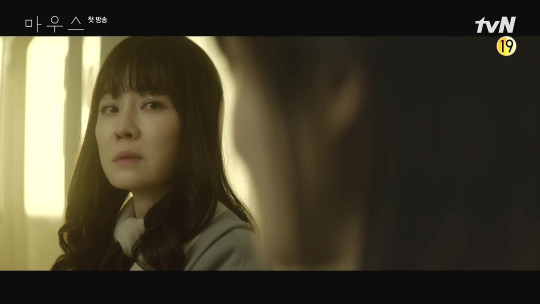
Seo-Joon was sentenced to death and spent his time in prison waiting for his sentence to be carried out. Five years later, he read a news article that Daniel had returned to Korea. Seo-Joon mailed two live rats to his former friend. Meanwhile, a little boy name Jae-Hoon also caught a rat to set it free in the snake enclosure at the zoo.
Jae-Hoon's teacher becomes concerned about his mental health when he kills the class rabbit as he wanted to check if it had gained weight or was pregnant. He scratches his arm to shreds, explaining that he is annoyed with the other kids but cannot take it out on them, so he takes it out on himself. Jae-Hoon's teacher mentions that the other kids are absent. Jae-Hoon becomes annoyed by the way she looks at him, as if he's weird. The teacher calls in Jae-Hoon's stepfather and informs him that a recent IQ test shows that Jae-Hoon is well above genius level. However, she expresses concern about his mental state and recommends therapy. Unfortunately, stepdad takes offense and reacts by dragging Jae-Hoon into an alley after school and slapping him hard. He then calls Jae-Hoon's mother to complain that Jae-Hoon humiliated him.

Jae-Hoon has two younger siblings (Jae-Min and Jae-Hee). Jae-Hee appears to have a mental disability. One day, Jae-Min catches Jae-Hoon pouring ammonia into his stepfather's fish tank. He pleads with Jae-Hoon not to kill his dad's favourite fish, but Jae-Hoon ignores him and continues. Afterward, Jae-Hoon takes his stepfather's dog, Choco, warns Jae-Min not to tell anyone. Upn stepdad's arrival home, he discovers his fish has passed away and Jae-Min is hesitant to speak. However, Jae-Hee repeats her brothers' conversation verbatim. Stepdad proceeds to search for Jae-Hoon and upon arriving at the park, he discovers his dog, Choco, floating lifeless in the pond. After finding Jae-Hoon, he drags him home and physically assaults him while calling him and "evil bastard".

Later, a bruised Jae-Hoon invites Jae-Min to visit Choco's grave in a nearby wooded area. Jae-Min was praying when Jae-Hoon pushed him into a hole that he had dug. Jae-Hoon accused Jae-Min of tattling, but Jae-Min denied it. Despite this, Jae-Hoon insisted that Jae-Min needed to be punished and began shoveling dirt into the hole. Fortunately, their mother arrives just in time. She pushes Jae-Hoon to the ground, helps Jae-Min out of the hole, and then begins to choke Jae-Hoon while telling him to die. Jae-Hoon looks up at his mother.
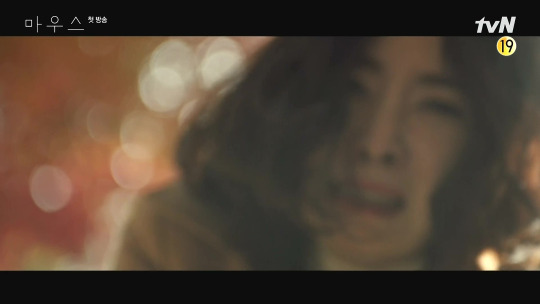
Jae-Hoon manages to escape and goes to the church where we first saw him. He asks Jesus if he's truly different and if he was genuinely born a monster. In the voiceover, he expresses his prayer to not become a monster.
However, fifteen years later, Jesus had never answered his prayer, and he ended up becoming a killer. In the flashback, Jae-Hoon stands over his stepfather's body while Jae-Min and Jae-Hee hide. He calmly removes the knife from the man's chest and slowly walks up the stairs where his mother waits.


2 notes
·
View notes
Text
🪻2023 My Kdrama Watchlist Award🪻
Last year I was so lazy and end up not doing the award show but I mention my best drama though..this year I'm a bit diligent coz not many drama I watch so it's easy to post😅
Before I begin I would like to make honourable mention:
Best Drama in January 2022: Our beloved Summer
Should have included in 2022 drama award but I forgot to include😅
So let's start with January- June :
Best Drama 2023
Crash Course in Romance (TVN)

This is the only drama that I watch during January till June..😅
No drama ever replaced them😅 the plot and chemistry was good..the ending as usual cliche but I love it.
Next, June till December 2023:
Best Drama 2023
Moving ( Disney+)

This is the best drama ever.its based on webtoon.
A superhero family kinda like drama..new fresh genre. Plus there's melo in it😍
Recommended to watch..seem like there will be season 2 maybe based on the cliffhanger on the ending.
Best Healing Drama 2023
See u in My 19th Life (TVN)

Quite healing as I still tears up remembering how shin hye sun said seo ha name.
It's also webtoon based. The incarnation story and how she remember every life really touched me.
Again TVN likes to ending in cliche way.
Best Mother and Daughter/ Police Drama 2023
Not Others ( ENA,Gennie TV,TVING)

At first I attracted coz there park sung Hoon and sooyoung..but the drama really attracted me to watch till finish.
The romance was moderate due to this drama focus on mother & daughter relationship plus police stuff.
The chemistry is good👍
And that's it..lastly best couple drama belong to





All of them😍😍😍😍
Happy New Year Everyone

P/s my demon and the story of park marriage contract will be include in 2024 as the drama has not finished..
Thank you for reading.
#2023#korean drama#my kdrama watchlist award#crash course in romance#not others#moving#see you in my 19th life#tvn#disney plus#tvn drama#drama award#my kdrama watchlist#my demon#the story of park's marriage contract#2024#not yet finish#our beloved summer#2022
4 notes
·
View notes